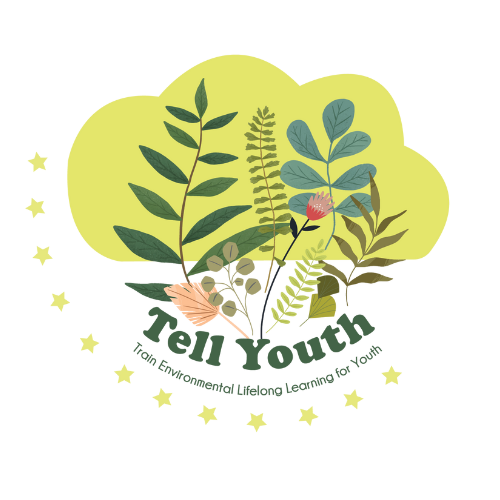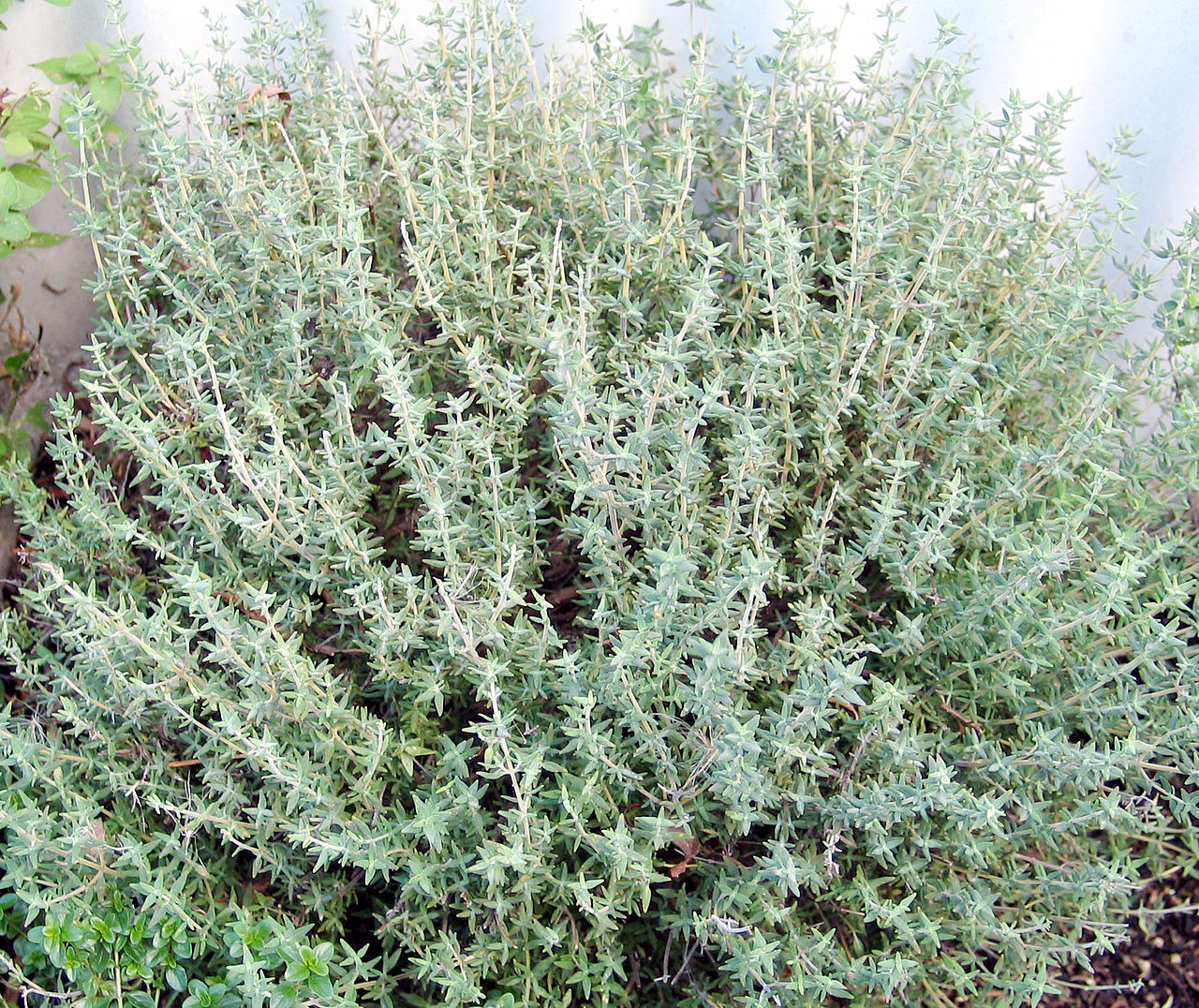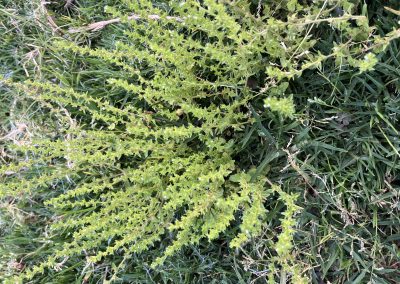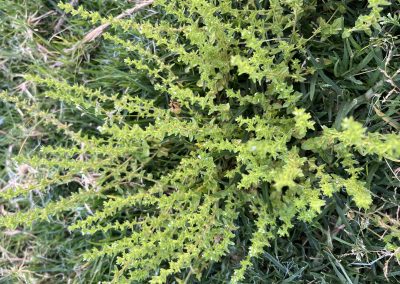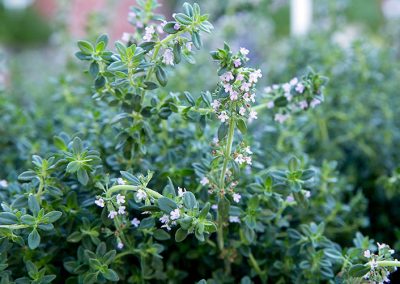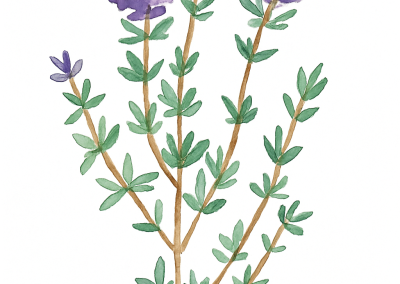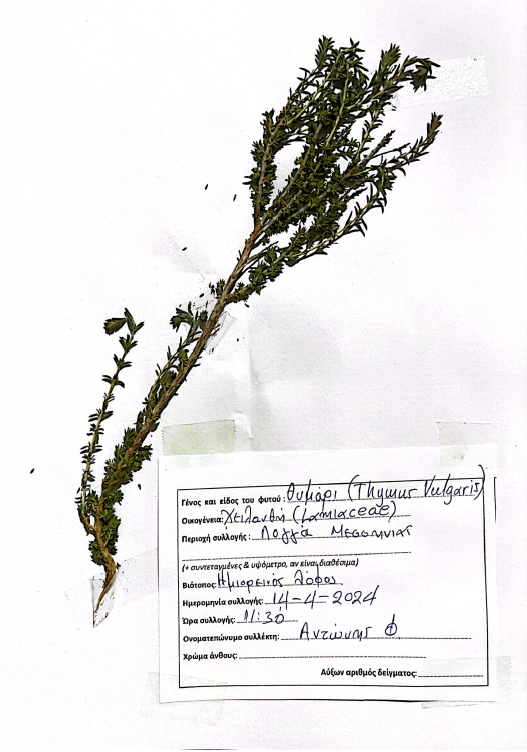Thymus vulgaris
Scientific description
Scientific name: Thymus vulgaris L.
Common name: Thyme
Kingdom: Plantae
Phylum/Division: Tracheophyta
Class: Magnoliopsida
Order: Lamiales
Family: Lamiaceae (Mint family)
Genus: Thymus
Species: Thymus vulgaris
Origin:
Native to the Mediterranean region (Spain, France, Italy, Greece). Widely cultivated worldwide for culinary and medicinal use.
Description:
Low-growing woody perennial herb, small shrub 20–40 cm tall. Tiny aromatic grey-green leaves. Woody stems spread horizontally and may root at nodes. Small tubular pink to lilac flowers bloom late spring–early summer. Strong pleasant aroma when leaves crushed.
Propagation:
By seed (slow germination), cuttings/layering (preferred for cultivated varieties), or division (spring/autumn).
Ecology:
Very attractive to bees, butterflies, hoverflies. Prefers well-drained sandy/rocky soil in full sun. Drought-tolerant, thrives in poor soils. Common in Mediterranean scrub, rocky hillsides, dry grasslands.
Uses:
Culinary: widely used in French, Italian, Mediterranean cuisine, retains flavor when dried. Medicinal: respiratory ailments, digestion, antiseptic. Contains thymol (antimicrobial, antifungal). Used in teas, tinctures, natural remedies, soaps, mouthwashes; essential oil with stimulating, purifying, therapeutic effects.
ΘΥΜΑΡΙ
Βασίλειο: Plantae
Φύλο (διαίρεση): Tracheophyta
Κλάση: Magnoliopsida
Τάξη: Lamiales
Οικογένεια: Lamiaceae (Οικογένεια της μέντας)
Γένος: Thymus
Είδος: Thymus vulgaris L.
Προέλευση:
Ισπανία, Γαλλία, Ιταλία, Ελλάδα. Καλλιεργείται ευρέως για μαγειρική και φαρμακευτική χρήση.
Περιγραφή:
Χαμηλής ανάπτυξης ξυλώδες πολυετές βότανο, μικρός θάμνος 20–40 cm. Μικροσκοπικά αρωματικά γκριζοπράσινα φύλλα. Ξυλώδη στελέχη που εξαπλώνονται οριζόντια και ριζώνουν στους κόμβους. Μικρά σωληνοειδή ροζ-λιλά άνθη ανθίζουν άνοιξη–καλοκαίρι. Έντονο άρωμα όταν τα φύλλα συνθλίβονται.
Πολλαπλασιασμός:
Με σπόρο (αργή βλάστηση), μοσχεύματα/διαστρωμάτωση (προτιμητέα), ή διαίρεση (άνοιξη/φθινόπωρο).
Οικολογία:
Πολύ ελκυστικό για μέλισσες, πεταλούδες, αιωροπεταλούδες. Προτιμά καλά στραγγιζόμενα αμμώδη/βραχώδη εδάφη, πλήρης ήλιος. Ανθεκτικό στην ξηρασία, ευδοκιμεί σε φτωχά εδάφη. Συνήθως σε μεσογειακά θαμνώδη οικοσυστήματα, βραχώδεις πλαγιές και ξηρά λιβάδια.
Χρήση:
Μαγειρική: Γαλλική, Ιταλική, Μεσογειακή κουζίνα, διατηρεί γεύση όταν αποξηραίνεται. Ιατρική: αναπνευστικά, πέψη, αντισηπτικό. Περιέχει θυμόλη (αντιμικροβιακή, αντιμυκητιακή). Χρησιμοποιείται σε τσάγια, βάμματα, σαπούνια, στοματικά διαλύματα, αιθέριο έλαιο με τονωτικές και θεραπευτικές ιδιότητες.
Thymus vulgaris
Nom commun: Thym commun
Règne: Plantae
Embranchement (Division): Tracheophyta
Classe: Magnoliopsida
Ordre: Lamiales
Famille: Lamiaceae (famille de la menthe)
Genre: Thymus
Espèce: Thymus vulgaris L.
Origine:
Bassin méditerranéen (Espagne, France, Italie, Grèce). Largement cultivé pour usage culinaire et médicinal.
Description:
Plante herbacée vivace ligneuse, petit arbuste 20–40 cm. Feuilles minuscules, aromatiques, gris-vert. Tiges ligneuses horizontales, enracinement possible aux nœuds. Fleurs tubulaires roses-lilas, floraison fin printemps–début été. Arôme puissant quand feuilles froissées.
Propagation:
Semis (lente germination), bouturage/marcottage, division (printemps/automne).
Écologie:
Très attractif pour abeilles, papillons, syrphes. Sols bien drainés, sableux/rocailleux, plein soleil. Tolère sécheresse et sols pauvres. Commun dans maquis méditerranéen, coteaux rocheux et prairies sèches.
Utilisation:
Cuisine: français, italien, méditerranéen, conserve la saveur après séchage. Médecine: voies respiratoires, digestion, antiseptique. Contient thymol (antimicrobien, antifongique). Utilisé en tisanes, teintures, savons, bains de bouche, huile essentielle stimulante et purifiante.
Thymus vulgaris
Denumire comună: Cimbru
Regn: Plantae
Diviziune: Tracheophyta
Clasă: Magnoliopsida
Ordin: Lamiales
Familie: Lamiaceae (familia mentei)
Gen: Thymus
Specie: Thymus vulgaris L.
Origine:
Regiunea mediteraneană (Spania, Franța, Italia, Grecia). Cultivat pe scară largă pentru uz culinar și medicinal.
Descriere:
Plantă perenă lemnoasă, tufiș 20–40 cm. Frunze mici, aromatice, gri-verzui. Tulpini lemnoase târâtoare, pot înrădăcina la noduri. Flori tubulare roz-liliachii, florile la sfârșitul primăverii și începutul verii. Aromă puternică la strivirea frunzelor.
Propagare:
Prin semințe (germinare lentă), butași/marcotaj, divizare (primăvară/toamnă).
Ecologie:
Foarte atractiv pentru albine, fluturi și sirfide. Sol bine drenat, nisipos/pietros, soare direct. Rezistent la secetă, prosperă în soluri sărace. Găsit în tufăriș mediteranean, versanți pietroși, pajiști uscate.
Utilizări:
Culinar: bucătărie franceză, italiană, mediteraneană, păstrează aroma uscat. Medicină tradițională: afecțiuni respiratorii, digestie, antiseptic. Conține timol (antimicrobian, antifungic). Folosit în ceaiuri, tincturi, remedii naturale, săpunuri, apă de gură, ulei esențial stimulativ și purificator.
Creative writing inspired by Thymus vulgaris
Thymus vulgaris — Thymon
In the age of heroes and gods, there was a brave warrior named Thymon, whose courage was unmatched. He fought in countless battles, always standing at the forefront, inspiring his fellow soldiers with his unwavering bravery. However, Thymon was not only known for his valor in battle but also for his connection to nature. He believed that strength did not only come from steel, but also from the earth itself, particularly from a humble herb that grew abundantly in the hills—thyme.
One fateful day, during a great war between the gods and mortals, Thymon faced a mighty adversary. The battle was fierce, and although Thymon fought valiantly, he was mortally wounded. As he lay on the battlefield, the goddess Artemis, who had been watching from above, descended to offer him comfort. Impressed by his courage and devotion to the natural world, Artemis blessed the herb he so cherished, transforming it into a symbol of strength and protection.
Thymon’s body, where he fell, became the birthplace of Thymus vulgaris. From his final breath, the small herb began to grow, spreading across the land, carrying with it his bravery. It was said that the scent of thyme would give strength to warriors before battle, and its oil would heal their wounds afterward. The herb became a sacred plant, used in both rituals of war and peace.
The people began to call it θυμάρι in honor of the fallen hero Thymon, believing that it carried his spirit of courage and resilience. Thyme became known as a symbol of fortitude, healing, and the enduring connection between humanity and nature.

